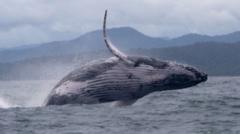A remarkable migration undertaken by a humpback whale has sparked significant interest among scientists, as it travels unprecedented distances across the world's oceans.
Epic Humpback Whale Migration Astounds Scientists

Epic Humpback Whale Migration Astounds Scientists
Unraveling a 13,000 km Journey Possibly Linked to Climate Change
A humpback whale has achieved an extraordinary migration, captivating scientists with its journey spanning at least 13,000 km. Last recorded off the coast of Colombia in 2017, the whale re-emerged near Zanzibar in the Indian Ocean, raising questions about the factors driving such an impressive odyssey. Researchers suggest that climate change might be influencing the depletion of vital food sources like krill, compelling the whale to traverse further distances in search of sustenance. Other experts theorize that the whale's migration may be motivated by the need to find new breeding territories, particularly as conservation initiatives bolster whale populations globally.
Ekaterina Kalashnikova from the Tanzania Cetaceans Program remarked on the unusual nature of this migration, noting it may represent the longest travel distance recorded for the species. Humpback whales are known for their migratory instincts, traveling annually between tropical breeding grounds and nutrient-rich feeding grounds in cooler waters. However, this particular male's journey stands out, connecting two far-flung breeding territories.
Kalashnikova posits that while the precise motivations for this migration remain unclear, a combination of global climate changes, an increase in environmental disturbances, and intrinsic evolutionary behaviors could play significant roles. The findings, featured in the journal Royal Society Open Science, leverage vast datasets sourced from citizen science efforts via happywhale.com, an initiative that uses artificial intelligence to track and analyze the unique tail patterns of humpback whales.
The journey, marked by multiple sightings of the whale over the years, has opened new avenues for understanding migration patterns among these majestic marine mammals. Scientists continue to study the environmental factors that may be influencing humpback whale behavior on an unprecedented scale.
Ekaterina Kalashnikova from the Tanzania Cetaceans Program remarked on the unusual nature of this migration, noting it may represent the longest travel distance recorded for the species. Humpback whales are known for their migratory instincts, traveling annually between tropical breeding grounds and nutrient-rich feeding grounds in cooler waters. However, this particular male's journey stands out, connecting two far-flung breeding territories.
Kalashnikova posits that while the precise motivations for this migration remain unclear, a combination of global climate changes, an increase in environmental disturbances, and intrinsic evolutionary behaviors could play significant roles. The findings, featured in the journal Royal Society Open Science, leverage vast datasets sourced from citizen science efforts via happywhale.com, an initiative that uses artificial intelligence to track and analyze the unique tail patterns of humpback whales.
The journey, marked by multiple sightings of the whale over the years, has opened new avenues for understanding migration patterns among these majestic marine mammals. Scientists continue to study the environmental factors that may be influencing humpback whale behavior on an unprecedented scale.



















